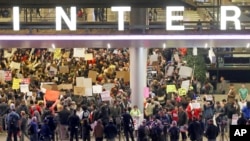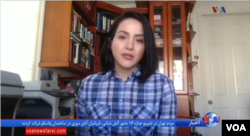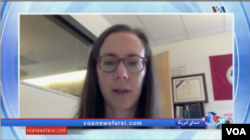Iranians around the world have been expressing concern about the temporary U.S. ban on travelers from Iran and six other predominantly Muslim countries.
Several callers to Monday’s VOA Persian Straight Talk program shared stories of personal travel plans or those of friends and family being thwarted or delayed by the U.S. entry restrictions, which took effect Friday.
“My brother, whom I helped to apply for a (U.S. permanent resident) green card, had entered Abu Dhabi airport (for a trip to the United States),” said Naderi, a woman calling from Los Angeles, California. “But he said Iranians with green cards were told they cannot fly to the U.S. and they were sent back to Iran after 18 hours of waiting.”
A man named Hamid calling from Seattle, Washington, said the U.S. travel ban had affected him personally. He said he departed from nearby Vancouver, Canada on Sunday for a ground journey to Seattle, but had to wait almost three hours at the Canadian-U.S. border before U.S. border agents allowed him to cross.
“I have a U.S green card, I’ve been living in the U.S for two years and haven’t traveled to Iran (in that time),” Hamid said. “But (the U.S. border agents) took me to a room and asked me tough and detailed questions, like whether I had traveled to Iran and why I had visited Vancouver — to which I answered ‘to visit my wife’.”
He said the U.S. agents advised him not to leave the U.S. for 90 days until the current travel ban is set to expire.
An Iranian woman who was detained herself upon arriving at Los Angeles airport on Saturday told VOA Persian’s LateNews program via Skype that U.S. immigration officials had asked her “highly personal" questions during a half-hour interrogation.
“They asked about my father’s finances, how he makes a living in Iran and whether I intend to marry and have a family here in the United States or in Iran,” said Neda Daemi, a 28-year old student who holds a U.S. green card and had traveled to Iran five months ago.
But she also told the LA Times newspaper that federal authorities treated her well during her 10-hour detention, after which she was released.
Los Angeles is home to one of the largest Iranian communities in the United States.
In another Skype interview for VOA Persian’s LateNews, the director of immigrant rights for the American Civil Liberties Union of California, Jennie Pasquarella, said President Donald Trump’s executive order imposing the travel ban will have a “tremendous impact” on LA’s Iranians.
“Many of them travel frequently to Iran to visit family members,” Pasquarella said. “Throughout the weekend, we were working with people who heard of their loved ones being in detention at Los Angeles airport and being coerced into signing papers revoking their visas or green cards. Many succumbed to that pressure, unfortunately, and were deported back to their home countries.”
The U.S. Customs and Border Protection agency did not reply to a VOA request for comment on the ACLU’s allegation.
But the Department of Homeland Security that runs the agency released a Sunday statement saying it will “treat all of those we encounter humanely and with professionalism.” It also pledged to “comply with judicial orders, faithfully enforce our immigration laws, and implement the president’s executive orders to ensure that those entering the U.S. do not pose a threat to our country or the American people.”
Many Iranians who commented on the VOA Persian Facebook page worried about how the U.S. travel restrictions will affect their own travel plans and relatives in the U.S. A VOA Persian web report featured some of the most frequently asked questions, including what people should do if they have made appointments to apply for U.S. visas at U.S. diplomatic missions neighboring Iran, such as those in Dubai or Armenia. Many also asked whether Iranian students in America will be deported.
Trump’s executive order calls for U.S. diplomatic offices to stop accepting visa applications from Iranians for 90 days. But it does not authorize deportations of Iranians who have legally entered the U.S.
Hooman Bakhtiar, Behrooz Samadbeygi and Straight Talk host Masoud Safiri of VOA’s Persian Service contributed to this report.






